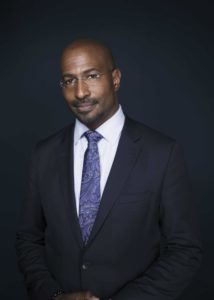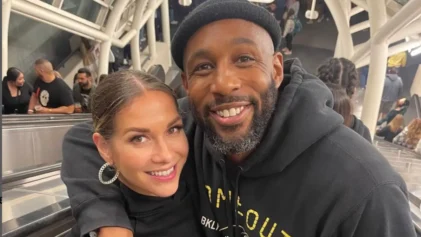
Van Jones is host of “The Messy Truth with Van Jones.” (Photo by Taylor Jewell /Invision/AP)
NEW YORK (AP) — Trying to bridge the partisan divide remains Van Jones’ vision even if it was the source of one of his roughest moments on CNN.
Jones, host of “The Messy Truth” who announced his affiliation with Jay Z’s Roc Nation management firm on Thursday, took heat from fellow liberals for praising President Trump’s salute to the widow of a Navy SEAL in a speech before Congress on Feb. 28. Trump “became president of the United States in that moment,” Jones said.
From the reaction, you would have thought that the Yale-educated lawyer who was drummed out of the Obama administration by Republican critics had joined the Freedom Caucus. The liberal website The Daily Kos called it the type of punditry “that was partially responsible for the election of a man who is a clear and present danger for America.”
Jones had a more direct confrontation on a New York City street with a man who accused him of trying to be even-handed at a time of good vs. evil.
Jones believes the flap was a product of click-bait culture and the raw feelings of Democrats.
“It showed some of the insecurities and anxieties of the liberals who were convinced that if even one pundit said one kind thing about Trump, then we’d have Hitler, that everything was at stake, and any kind of nuance was just the road to fascism in America,” Jones said. “When you’re in that kind of mind state, then you jump at a lot of shadows.”
His boss, CNN Worldwide President Jeff Zucker, said he believed the criticism was unfair and illustrated a lack of tolerance that is one of the problems with politics today.
Jones was perhaps the most memorable media figure of election night last fall, both for his discussion of a “whitelash” that helped Trump and an electric confrontation with former Trump campaign manager and then-CNN analyst Corey Lewandowski (“Corey, you’re a horrible person right now.”). Jones hasn’t seen or talked to Lewandowski since that night.
He has a more respectful relationship with Jeffrey Lord, CNN’s current Trump point person. “He amazes me with the creativity of his nonsense,” Jones said.
Jones’ “Messy Truth” has tried to harness some of the star power Jones earned during the campaign, Zucker said. The show is on hiatus as Jones finishes a book, but Zucker said he hopes it airs two or three times a month when it resumes.
“He’s articulate, he’s passionate and he’s smart, and that’s a great combination,” Zucker said. “He’s not afraid to say what’s on his mind and he’s not afraid to break with orthodoxy.”
In Jones’ mind, the country has moved beyond partisanship into a form of tribalism. He recalled that when he joined Instagram and followed hundreds of liberal friends, his feed was a comfortable reflection of what he believed in. But that frustrated him. He made sure to add some conservative voices to get a different perspective.
“If you come in only saying one side is great and the other side is terrible, you’re going to miss a whole bunch,” Jones said. “You can never say, ‘I disagree with these guys, but on these two points, they’re 100 percent right. And on these two points, we’re really, really stretching it.’ You can’t have a healthy democracy” without the ability to do that.
Conservatives need to own up to where their leaders are not defending conservative principles and, for example, speak out against interference by the Russians. Liberals have to take stock of their own weaknesses, too.
“It doesn’t matter if you’re talking about someone who is poor from Appalachia or someone who just lost their job in the Rust Belt, there’s very little room in the liberal imagination for straight white guys to be the good guy, and that’s a problem,” he said. “Liberals have gotten — some section of liberals — uncomfortable with opposing views.”
The point of “The Messy Truth” is to get people with opposing views speaking to one another.
Jones describes the show as “a mash-up of Phil Donahue, with the live audience, Anthony Bourdain, where I’m going out into the countryside and discovering America, and a little bit of televangelism, where I get to do a little preaching.”
He displayed that side at a Manhattan church one day last week, speaking to a group of political activists. Clearly familiar with a preacher’s cadence, he locked the audience into his vision of peaceful political combat.
“I want to be better,” he said. “Not bitter.”
His activist goals explain the new affiliation with Roc Nation, where he hopes to give more attention to work that isn’t talked about much on cable TV. He works on several initiatives: helping young people from underrepresented backgrounds find work in the tech sector, helping train San Quentin inmates for media work, fighting pollution to water supplies and other areas that affect families, and seeking to reduce the prison population. He’ll soon announce a national tour for his “Love Army” movement.
Sounds like the groundwork for accomplishments that can fuel a political career, right?
“Oh, hell no,” he said, “because I’ve seen the biggest job up close and it takes people that have a different skill set than I have.”


